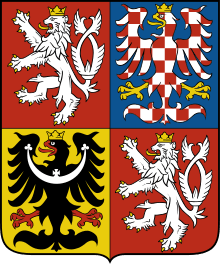Petr Pithart
| Petr Pithart | |
|---|---|
.jpg) | |
| President of the Senate | |
|
In office 18 December 1996 – 16 November 1998 | |
| Preceded by | office established |
| Succeeded by | Libuše Benešová |
|
In office 19 December 2000 – 15 December 2004 | |
| Preceded by | Libuše Benešová |
| Succeeded by | Přemysl Sobotka |
| Senator from Chrudim | |
|
In office 1996–2012 | |
| Preceded by | office created |
| Succeeded by | Jan Veleba |
| 1st Prime Minister of the Czech Republic (Federal part) | |
|
In office 6 February 1990 – 2 July 1992 | |
| President | Václav Havel |
| Preceded by | František Pitra |
| Succeeded by | Václav Klaus |
| Personal details | |
| Born |
2 January 1941 Kladno, Protectorate of Bohemia and Moravia |
| Nationality | Czech |
| Political party |
KSČ (1959-68) OF (1989-91) OH (1991-92) KDU–ČSL (since 1998) |
| Spouse(s) | Drahomíra Hromádková |
| Children |
David Klára |
| Alma mater | Charles University |
| Occupation | Lawyer |
| Religion | Roman Catholicism |
| Website | pithart.cz |
Petr Pithart (born 2 January 1941 in Kladno) is a Czech politician, lawyer and political scientist.
He served as Prime Minister of the Czech Republic (then part of Czechoslovakia) from 6 February 1990 to 2 July 1992. He has sat in Senate of the Czech Republic since its inception in autumn 1996, serving as its chairman from 18 December 1996 to 16 December 1998 and from 19 December 2000 to 15 December 2004.
Political career
Pithart was member of Communist Party of Czechoslovakia since 1960, was active in the Prague Spring and left the party after the Soviet invasion; later he was one of the most prominent dissidents against the communist regime. He was imprisoned for this activity including being one of the first signatories of Charter 77. In 1989 he was one of the prominent leaders of the Civic Forum founded at the start of the overthrow of the regime. Having participated in the negotiations which led to the change of the federal, Czech and Slovak governments, he was appointed Prime Minister of the then Czech Socialist Republic.
Pithart is viewed by many as an indecisive philosopher and thinker, rather than a tactical or charismatic leader. His 1990-92 Czech government was not capable of dealing with the actions of the federal Minister for Finance Václav Klaus and his increasingly popular Civic Democratic Party nor growing Slovak nationalism which led in the end to dissolution of Czechoslovakia as well as his defeated party, Civic Movement.
Finally, he failed in his bid to become President of the Czech Republic at the 2003 election, losing to rival Václav Klaus due to the government coalition's disunity as well as his unwillingness to do a deal with the Communist Party of Bohemia and Moravia - a barrier which the more stridently public anti-communist Klaus had no difficulty ignoring or, subsequently, refusing to discuss.
In 1999 he became a member of the Christian and Democratic Union - Czechoslovak People's Party.[1]
He was elected as senator in 1996. He was re-elected in 2000 and 2006. He was the First Deputy Chairman of the Senate of the Parliament of the Czech Republic from 2004 to 2012.[2] In 2012 he retired.
References
External links
![]() Media related to Petr Pithart at Wikimedia Commons
Media related to Petr Pithart at Wikimedia Commons
- (Czech) http://www.pithart.cz – Official site
